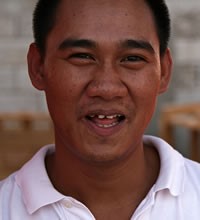Filipino, Tagalog in Aruba

Photo Source:
MySabah.com
Used with permission
|
Send Joshua Project a map of this people group.
|
| People Name: | Filipino, Tagalog |
| Country: | Aruba |
| 10/40 Window: | No |
| Population: | 900 |
| World Population: | 40,052,100 |
| Primary Language: | Tagalog |
| Primary Religion: | Christianity |
| Christian Adherents: | 93.00 % |
| Evangelicals: | 8.00 % |
| Scripture: | Complete Bible |
| Ministry Resources: | Yes |
| Jesus Film: | Yes |
| Audio Recordings: | Yes |
| People Cluster: | Filipino, Central |
| Affinity Bloc: | Malay Peoples |
| Progress Level: |
|
Introduction / History
Tagalog is the largest ethnic/language group residing in the Philippines, especially in the southern part of Luzon and nearby islands. The regions of Calabarzon and Mimaropa have the greatest concentrations.
They are one of the ancient dwellers of the Philippines. Tagalog culture developed in Taal, Batangas (the heartland of the Tagalog culture). The traditions of this people were passed orally. They developed a trading link with neighboring countries such as China, Japan, etc. Tagalogs have a writing system called baybayin. It uses diacritics to determine its pronunciation (similar to the Devanagari script of India).
During the Spanish colonization of the Philippines, the Tagalog homeland (especially Manila) became the center of colonial activity. The culture of these people dramatically changed from Asian to Hispanic culture (a combination of the two) during their rapid Christianization.
They eventually revolted against the Spanish colonizers. Along with other ethnic groups, Tagalogs fought against the invading Americans and later, the Japanese.
After gaining their independence, the Tagalog population grew rapidly. A poor economy and political corruption have led to poverty, causing many to migrate to 56 countries for work. One of these countries is Aruba, a nation in the Caribbean Sea.
What Are Their Lives Like?
Tagalogs in Aruba earn far more than they would had they remained in the Philippines. They are more likely to come to Aruba as tourists, but some have opened Filipino restaurants. Filipino food is popular there.
What Are Their Beliefs?
Mission work was initiated among the Surma in the early 1970s. Due to various outside pressures, however, this Christian outreach lasted only a few years before leaving. There is a gospel witness among them, though it is weak.
What Are Their Needs?
They need a complete harvest among all Suri peoples.
Prayer Points
Pray for the Lord to be their protector.
Pray for Tagalogs to focus their faith and devotion on Jesus Christ, the only savior.
Pray for them to become a major sending base to Muslims.
Pray that soon Tagalog disciples will be making more disciples.